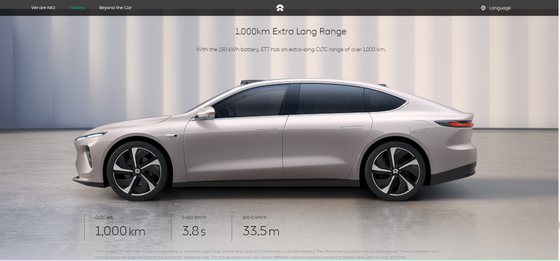Nio has been something of a surprise box among pure electric model builders. Founded in 2014, the Chinese electric car brand quickly jumped into the spotlight. It only took him three years to start collecting records with his EP9 supercar, breaking times on all the tracks it passed through, from the legendary Nürburgring to the Circuit of the Americas. And it never stopped surprising, building a unique business model in the market, ranging from own charging solutions (Nio Power) to battery change stations, offering these as a service that is charged separately, such as changing a discharged battery for a recharged one. The advantage is that the customer does not bear the cost of the battery. and therefore, you don’t have to deal with “loss” when it reaches the end of its useful life. The customer saves even more time, since the battery change operation is incomparably faster than charging.
The surprise, now, is associated with the 150 kWh battery, which promises 1,000 km of autonomy on a single charge. This is because this battery alone costs around 328,000 Yuan Renminbi, about €45,000.. That is to say, almost the price at which the cheapest Nio model, the ET5 saloon, is sold in Germany, which costs €49,900 there (but without battery).
Nio Chinese come with everything to Europe. this is the strategy
It is common to say that the battery is the most expensive component of an electric vehicle, but in this case, Nio will have considered that the value is so prohibitive that the company itself assumes that this accumulator, unlike the packages of 75 or 100 kWh, it will not even be for sale at an early stage. Anyone who wants to enjoy a more relaxed autonomy, only possible with the 150 kWh battery, will have to rent it. The news is advanced by the local press, requiring clarification on the issue of autonomy announced with a single charge.
It is important to remember that the magical figure of 1000 km began to be discussed with the ET7, Nio’s flagship, whose most powerful version has two motors, one per axle, that add up to 480 kW/653 hp and 850 Nm of torque. pair. . The ET7 was revealed in 2021 and began landing in Europe last summer, to keep the ES8 SUV company. But the electric saloon of the Chinese E segment was initially available only with the packages of 75 and 100 kWh, with a more limited autonomy, and this is where the due clarification lies: the brand communicates range estimates based on the China Light Vehicle Test Cycle (CLTC), the equivalent of the old and very optimistic NEDC, as you can see below in the information available on the official website of the brand.

But, using the ET7 configurator in Germany, we found that with the standard battery (75 kWh), the Chinese tram will not travel more than 500 km, but 445 km according to the European WLTP protocol. Likewise, with the 100 kWh accumulator, which promises more than 700 km between recharges, it ends up certifying 580 km with the European method of measuring consumption and emissions. So with the introduction of the 150kWh battery this year, it will more realistically provide possibly 750km between stops on a full charge. and not the estimated 1000 km according to the Chinese CLTC protocol.
According to CnEVPost, the pack of 150 kWh has an energy density of 360 Wh/kg, being supplied by Beijing WeLion New Energy Technology. It is expected to be available in the 1st semester of this year, initially only for rent. The price, about 328,000 yuan renminbi, was announced by Nio co-founder and chairman Qin Lihong at a customer event in Changzhou, China’s Jiangsu province. Currently, the brand charges €12,000 in Europe for the purchase of the standard battery and €21,000 for the purchase of the 100 kWh accumulator, so the high value of the pack 150 kWh semi-solid may indicate difficulties to produce it on a large scale. In any case, the purchase of the battery, even if it is the smallest and cheapest, makes the most affordable Nio (the ET5) jump from €49,900 without a battery to €61,900. The leasing implies a monthly payment of €169 for the standard battery, which rises to €289/month with the pack of 100kWh. The price to be charged for leasing the new 150 kWh battery has not yet been announced.
Source: Observadora
